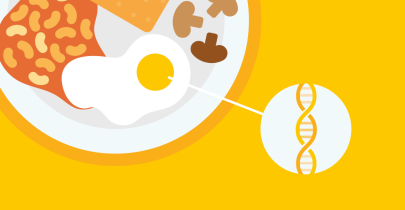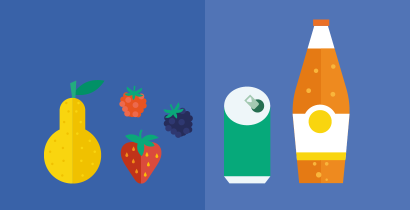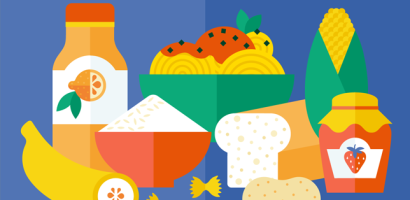Glucose and The Brain: Improving Mental Performance
Last Updated : 30 April 2013Glucose is a type of sugar which the brain depends on for fuel. Studies show that dips in glucose availability can have a negative impact on attention, memory and learning, and that administering glucose can enhance these aspects of cognitive function. The brain also uses up more glucose during challenging mental tasks. Therefore, it may be especially important to keep blood glucose levels at an optimum level for good cognitive function. Consuming regular meals may help to achieve this.
Glucose as fuel
Glucose is a type of sugar which comes predominantly from starchy foods (bread, rice, pasta and potatoes) as well as fruits, juices, honey, jams and table sugar. The body can break down the digestible carbohydrates in these foods into glucose, which is transported in the bloodstream to the brain and other organs for energy. The body tightly regulates blood glucose levels; this is known as glucose homeostasis. A process called gluconeogenesis allows the body to make its own glucose from the building blocks of protein and fat. Glucose can be stored in form of glycogen in the liver and to a somewhat lesser extent in the muscle. Glycogen forms an energy reserve that can be quickly mobilised to meet a sudden need for glucose (physical exercise), but also when glucose intake from food is insufficient (during fasting, for example), the body can get glucose by breaking down its glycogen stores. Liver glycogen is nearly depleted 12 to 18 hours after eating, overnight fasting, for example, after which the body relies more on energy from breaking down fats.
The energy needs of the brain
The human brain is made up of a dense network of neurons, or nerve cells, which are constantly active — even during sleep. To obtain the energy needed to sustain this activity, the brain depends on a continuous supply of glucose from the bloodstream. A healthy diet should provide 45-60% of total energy from carbohydrates.1 A normal weight adult requires 200 g of glucose per day, two-thirds of which (about 130 g) is specifically needed by the brain to cover its glucose needs.
The brain competes with the rest of the body for glucose when levels dip very low — such as during starvation. By tightly controlling its share of glucose under these conditions, the brain can maintain its high level of activity. It does this through two main mechanisms: first, by drawing glucose directly from the blood when its cells are low on energy; and second, by limiting the amount of glucose available to the rest of the body so that there is more available to the brain.2,3 These mechanisms are essential for survival. Unlike muscles (including the heart), and the liver, the brain cannot use fatty acids directly for fuel.
Glucose and the mental performance
Despite this sophisticated regulation, short-term dips in glucose availability do occur in certain brain areas. These may impair various cognitive functions such as attention, memory, and learning.4
Studies on glucose have demonstrated how administering this sugar can improve cognitive functioning — in particular, short-term memory and attention.4 Most of these studies give participants a set amount of glucose as a drink. A study by Sünram-Lea and colleagues found that a glucose drink significantly improved long-term verbal memory and long-term spatial memory in young adults. The effect was similar whether the drink was consumed after an overnight fast, a two-hour fast post-breakfast, or a two-hour fast post-lunch.5 Similarly, Riby and colleagues found glucose enhanced memory.6
The more demanding mental tasks appear to respond better to glucose than simpler tasks. This may be because the brain’s uptake of glucose increases under conditions of mild stress, which includes challenging mental tasks.4
Given that the brain is sensitive to short-term drops in blood glucose levels, and appears to respond positively to rises in these levels, it may be beneficial to maintain adequate blood sugar levels in order to maintain cognitive function.4 Eating regular meals may help to achieve this. In particular, studies in children and adolescents have shown that eating breakfast can help to improve mental performance by boosting ability in memory- and attention-related tasks.7
Conclusion
The brain is a highly active organ that relies on glucose for fuel. Glucose comes either directly from carbohydrate-containing foods and drinks, or is produced by the body from non-carbohydrate sources. Keeping blood sugar levels at an optimal level appears to be helpful for maintaining good cognitive function, particularly for more mentally demanding tasks. Consuming regular meals may be a useful way of achieving this.
References
- European Food Safety Authority (EFSA) (2010). Scientific Opinion on Dietary Reference Values for carbohydrates and dietary fibre. EFSA Journal 8(3):1462.
- Peters A (2011). The Selfish Brain: competition for energy resources. American Journal of Human Biology 23:29-34.
- Peters A, Kubera B, Hubold C, et al. (2011). The Selfish Brain: Stress and eating behavior. Frontiers in Neuroscience 5(74):1-11.
- Bellisle F (2004). Effects of diet on behaviour and cognition in children. British Journal of Nutrition 92(Suppl 2):227-232.
- Sünram-Lea SI, Foster JK, Durlach P, et al. (2001). Glucose facilitation of cognitive performance in healthy young adults: examination of the influence of fast-duration, time of day and pre-consumption plasma glucose levels. Psychopharmacology 157:46–54.
- Riby LM, Law AS, Mclaughlin J, et al. (2011). Preliminary evidence that glucose ingestion facilitates prospective memory performance. Nutrition Research 31(5):370-377.
- Hoyland A, Dye L & Lawton CL (2009). A systematic review of the effect of breakfast on the cognitive performance of children and adolescents. Nutrition Research Reviews 22:220-243.



